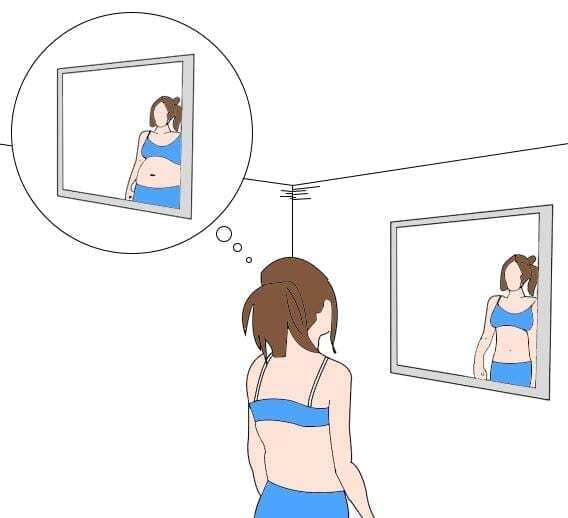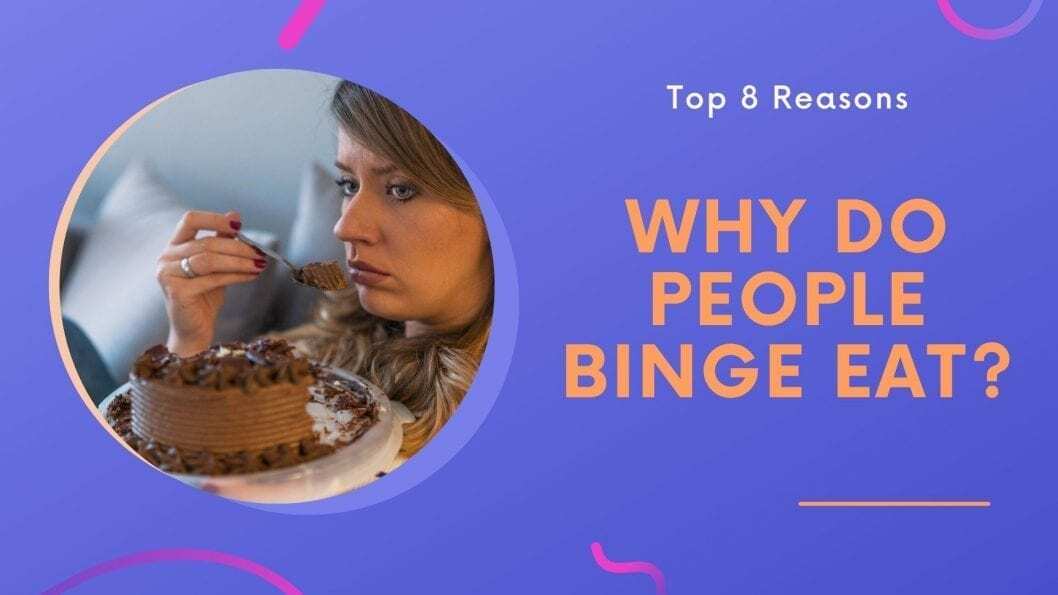Everyone overeats occasionally. However, binge eating is much more extreme.
What drives people to eat so much? Why do people binge eat?
This post explores the top 8 reasons why people turn to binge eating.
Please keep in mind there can be multiple reasons behind binge eating.
For example, you can be depressed and have a history of dieting.
The more factors that are present, the higher the likelihood of binge eating.
Let’s first distinguish between overeating and binge eating:
Five Main Differences Between Overeating Versus Binge Eating
Binge eating is when you overeat and these binges:
- Repeatedly happen
- Cause tremendous stress
- Make you feel like you lose control
- Lead to horrible guilt and shame afterwards
- Often happen when you are alone
Do you see the difference? Overeating happens to everybody.
But overeating for many people is different from binge eating because it is:
- Not very stressful
- No guilt afterwards
- Not done alone
- Not done repeatedly
- Does not involve loss of control
Now that we’ve covered the difference between emotional eating and binge eating disorder, So why do people binge eat?
1 – Dieting
Dieting is the gateway to binge eating.
Oftentimes diets promote two unhealthy behaviors which lead to binge eating:
- Skipping meals
- Eating too little
And there is a common statistic that 95% of diets fail. Oftentimes when someone fails their diet they say they ‘fell off the wagon’.
And oftentimes when someone says they ‘fell off the wagon’ what they mean is that they had a binge eating episode.
Nowadays many diets no longer call themselves diets. For example, the following are all diets in disguise:
- Detox
- Cleanses
Be careful when dieting because dieting is one of the biggest causes of binge eating.
Here’s the bottom line:
If you eat too little whether due to skipping meals, removing foods from your diet, or just not eating enough in general, you put yourself at higher risk for binge eating.
2 – Genetics
Genes play a huge role in binge eating.
The Boston University School of Medicine published a study showing how they were able to locate a gene responsible for binge eating in mice.
While mice are different from humans, research does show conclusively that many people who struggle with eating have parents who also struggle with eating.
Perhaps you can answer this question for yourself:
- Do you struggle with food?
- If so, do you have a parent who struggles with food too?
Research would suggest that if you answer “Yes” to the first question, you’ll probably answer “Yes” to the second question as well.
3 – Negative Body Image

Many people who binge eat have a negative body image. This negative body image motivates the person to diet.
However, remember dieting often leads to binge eating!
Why does a person have a negative body image in the first place?
Our culture with all of its social media often promotes a body image that is too thin.
For example, it’s estimated that we see between 400-600 body images per day on average.
But many of these images are of thin women.
This leaves many women who are just fine the way they are with a not-perfectly-thin body with a negative body image and seeking to lose weight.
But remember, dieting is the most common form of weight loss and it often leads to binge eating.
Many people are actually fine with a bit more fat on their bodies than what the modeling images in the magazines show.
But if you only see images of thin bodies, you’ll think you’re fat and unhealthy, when in reality you’re just fine.
These negative body image thoughts will then drive you to dieting … which has all sorts of negative consequences, like disconnecting from your authentic voice and only listening to the inner critic.
4 – Stress
Many people often rely upon eating to calm themselves down.
Using food to cope with stress is called ‘Emotional Eating’.
However, emotional eating can turn into binge eating if other factors are present.
For example, if a person is under stress, has a history of dieting, and has the genetics for binge eating …
These factors can combine to make emotional eating turn into binge eating.
Stress is a major common factor behind why people binge eat.
5 – Depression

Depression and binge eating are difficult to separate.
What comes first? Do people binge because they are depressed? Or is someone depressed and then they binge?
It’s like the chicken and the egg. However, it doesn’t really matter.
According to WebMD, studies have shown that up to 50% of people with binge eating disorder have also been diagnosed for depression.
6 – Social Relationships
Family and other social relationships can greatly influence the chance that someone will become a binge eater, in part by enhancing some of the factors discussed above.
For example, oftentimes a parent will criticize their child’s body, causing the child to have a negative body image.
This child may then turn to dieting out of a mistaken belief that they need to look a certain way to get their parent’s love.
And maybe as a child you saw that your parents handled stress by eating food.
As a child, you could have great parents. However, even if your parents were great, if your parents:
- Taught you how to organize information instead of your emotions you could still have a tendency to binge eat
- If your parents were overly strict with you in your education
- Didn’t properly attune to your emotions
All these parenting factors could lead to someone binge eating down the line.
And social relationships extend beyond the family too.
Perhaps you have other friends or relationships with people who tend to use food to cope with difficult emotions.
Oftentimes, people will make friends with other people following a diet and then they too become more involved with dieting.
And as dieting increases then binge eating follows.
7 – Why Do We Want To Binge Eat? Chemicals
There is incredible stress and guilt associated with binge eating.
It might seem strange …
But many people actually like binge eating in some ways.
Oftentimes people think that giving up binge eating would mean a loss of something important.
Why is this?
It turns out that binge eating is linked to a release of ‘happy’ chemicals as well.
Oftentimes when people binge eat they are running away from their emotions.
In these cases binge eating can provide a rush of serotonin and dopamine, which can ‘numb’ the person’s emotions.
When numb, a person is no longer in pain. They are temporarily ‘happy’.
Here’s how this looks like in a binge scenario:
- Incredible stress as a person feels themselves losing control
- Numbness / disconnection as a person eats
- Horrible guilt and shame afterwards
While binge eating overall is negative, we cannot forget that powerful chemicals are a major reason why people binge eat.
8 – Low Self-Esteem
Low self-esteem is the final factor.
When a person suffers from low self-esteem they are less likely to care about their well being.
This person might:
- Skip meals
- Not sleep well
- Have less resilience to stress
- Be more easily swayed to diet
Sadly, many people who binge eat think to themselves that their binge eating is a form of punishment.
(It’s interesting how a person can ‘think’ binge eating is a punishment, while chemically speaking their body becomes addicted to the chemicals. You can think one thing and feel the opposite.)
For example, a person with low self-esteem might have a rule to not eat more than 1000 calories per day.
This is extremely low! And not eating enough will cause binge eating.
So eventually this person will end up eating more than 1000 calories.
However, this person may then view their failure to mean they need to binge to ‘punish’ themselves.
This is how an overeating episode turns into a full blown binge in some cases.
What Is The Main Cause Of Overeating?
- Dieting
- Genetics
- Negative Body Image
- Stress
- Depression
- Social relationships
- Chemicals
- Low self-esteem
While all of these can be important, the main cause of binge eating is dieting.
The reason is simple. Except for genetics, all these factors lead back to dieting.
Now, a person might ‘accidentally’ diet if they are under lots of stress.
For example, in stressful situations a person might skip meals or undereat accidentally.
Sometimes people undereat when they are depressed.
Other times the link is more direct. With negative body image and low self esteem, for example, a person could become more likely to diet.
Relationships can also impact a person to have a negative body image and low self-esteem, which again leads back to dieting.
What Happens To Your Body When You Binge Eat?
There are 3 primary time periods to consider when you binge eat:
- Before
- During
- After
Body Before You Binge Eat

Before you binge eat you will start to lose control.
During this phase, your neocortex starts to get shut down by your limbic brain.
In other words, your ‘thinking’ self gets shut down by your ‘animal’ self.
This is called ‘tunnel vision’.
In tunnel vision you will start to feel like you ‘must’ binge eat.
You will start getting powerful cravings.
These cravings will feel impossible to ignore.
Your body will begin to tighten to resist the cravings, but you won’t be able to.
Soon your body will be under so much tension and stress that the only way to release the stress will be to binge eat.
Body During A Binge
On a binge your sense of time may be distorted because your ‘thinking’ brain was shut down beforehand.
Oftentimes time will fly by. Hours will pass.
You eat such a large quantity of food, bags upon bags of food.
Your memory of what you eat almost gets wiped out.
It’s like life is in a haze.
You’ll become very fatigued, tired, and slow.
You may go back several times to eat again.
There are sharp pangs of guilt.
Often a thought of ‘self-punishment’ begins to repeat itself.
- I always fail
- Might as well keep eating because I already f*cked up today
- I can’t stop
Many times people will continue overeating as:
- Punishment
- As a way to avoid the inner critic
Body After A Binge
One of the main “benefits” of a binge is the stupor you go into afterwards.
This stupor is what’s known as ‘escapism’.
You’re mind is blank, temporarily.
Numb.
Coma.
Essentially you’re high on drugs.
Your body has been racked with stress.
You’ve eaten sometimes 2000+ calories.
(A binge is on average 1000 calories, with 25% over 2000).
Multiple times driving through fast food places.
Getting a box of donuts and polishing them off while on the way home from work.
Getting up in the middle of the night for bowls of food and going back to bed.
Too exhausted.



